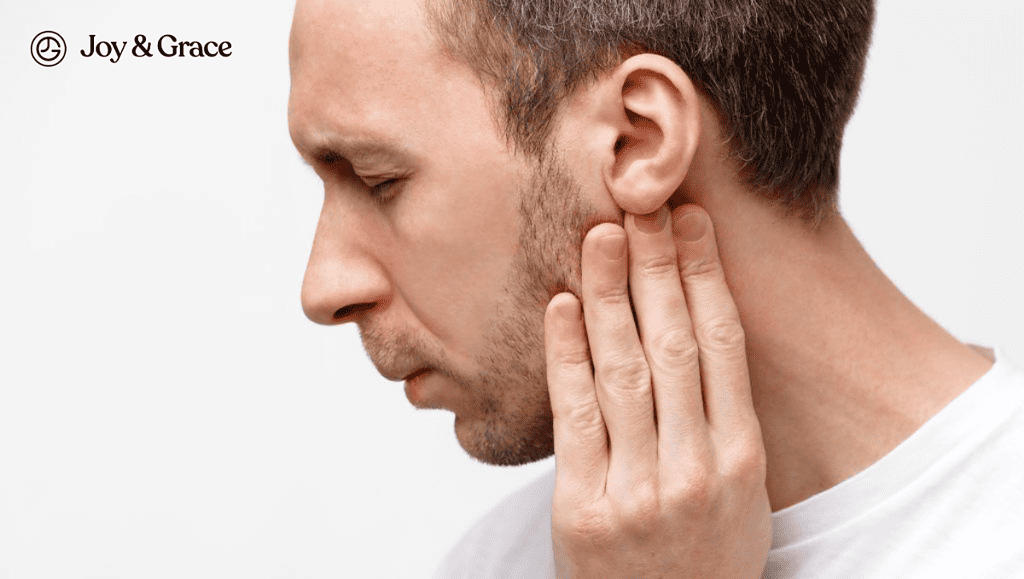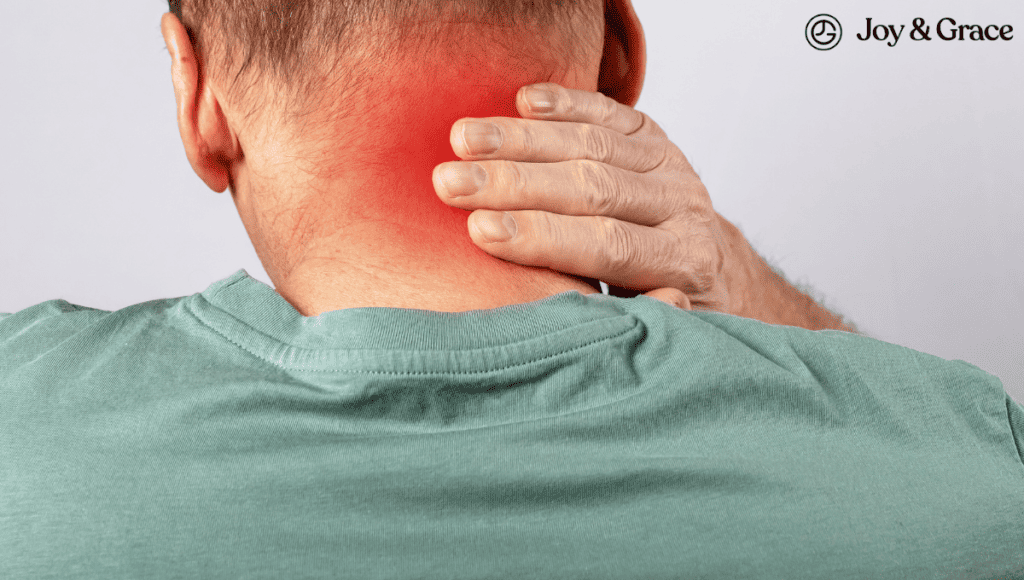Have you ever woken up with pain behind your ear and a stiff neck? It's not the best way to start the day, is it? But don't worry; you're not alone. Many people experience these symptoms, and various things can cause them. The good news is that most causes are not serious and can be treated.
We’ll be taking a closer look at the possible reasons behind this unwelcome duo of pain and stiffness. So, let's get started and find out how you can deal with these unwelcome symptoms and get back to feeling your best!
What Causes A Stiff Neck And Ear Pain?
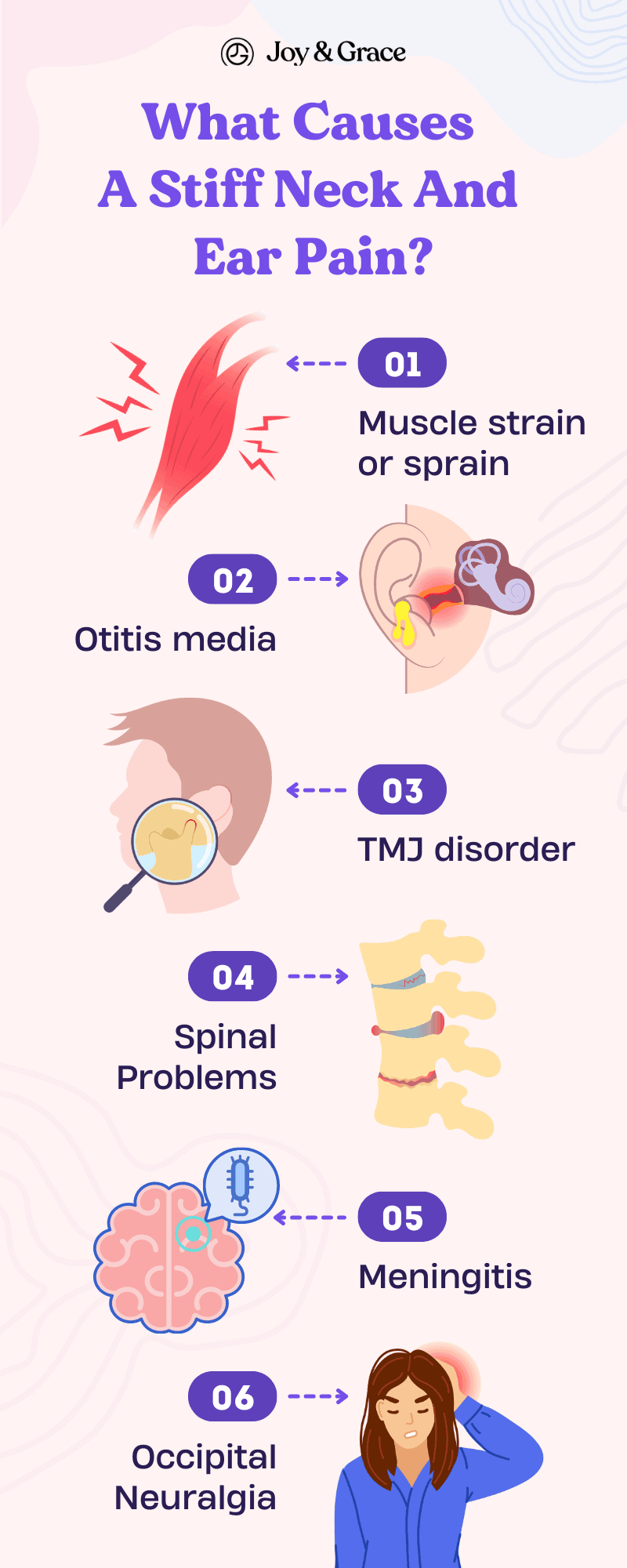
The medical term for pain behind the ear is postauricular pain. This pain is often felt where the ear meets the skull and can be accompanied by multiple symptoms, including neck stiffness. A stiff neck and ear pain can be caused by a variety of conditions, including:
- Muscle strain or sprain. This is a common cause of neck stiffness, often caused by poor posture, sleeping in an awkward position, or an injury. The pain can radiate to the ear and cause discomfort.
- Otitis media. A middle ear infection, called otitis media, can cause ear pain and discomfort. The pain can sometimes radiate to the neck and cause stiffness.
- Temporomandibular joint (TMJ) disorder. It's a mouthful to say, but basically, it's a problem with the joint that connects your jaw to your skull. TMJ disorders can cause face, neck and jaw pain that sometimes radiate to the ear. We have an article on TMJ disorders here.
- Spinal Problems. In some cases, stiff neck and ear pain may be caused by a problem with the cervical spine (neck). Conditions such as cervical spondylosis, herniated discs, or spinal stenosis can cause neck pain radiating up into the ear.
- Meningitis. Meningitis is a severe infection of the membranes surrounding the brain and spinal cord. It can cause a stiff neck, headaches, and ear pain.
- Occipital Neuralgia. Occipital neuralgia is a type of headache that involves pain in the back of the head, particularly around the base of the skull and behind the ears. This pain is caused by irritation or compression of the occipital nerves, which run from the upper part of the neck to the scalp.
Can Ear Pain And Neck Pain Be Related?

Otalgia (ear pain) and neck pain, two things you never want to experience. But sometimes, they come together like a terrible two-for-one deal. It turns out that many conditions can cause pain in both areas.
Otalgia and neck pain can be related because they share common nerve pathways that can cause pain in both areas.
The ear and neck are connected by nerves that run through the spine and can be affected by muscle tension, inflammation, or injury. When there is a problem with these nerves, it can cause pain in both the ear and the neck.
For example, a stiff neck due to poor posture or muscle strain can cause pain in the neck and the ear because the nerves that serve both areas are affected. Throat or neck infections can also cause pain in your ear.
Similarly, an ear infection or inflammation can cause pain radiating down the neck.
Can Occipital Neuralgia Cause A Stiff Neck And Ear Pain?
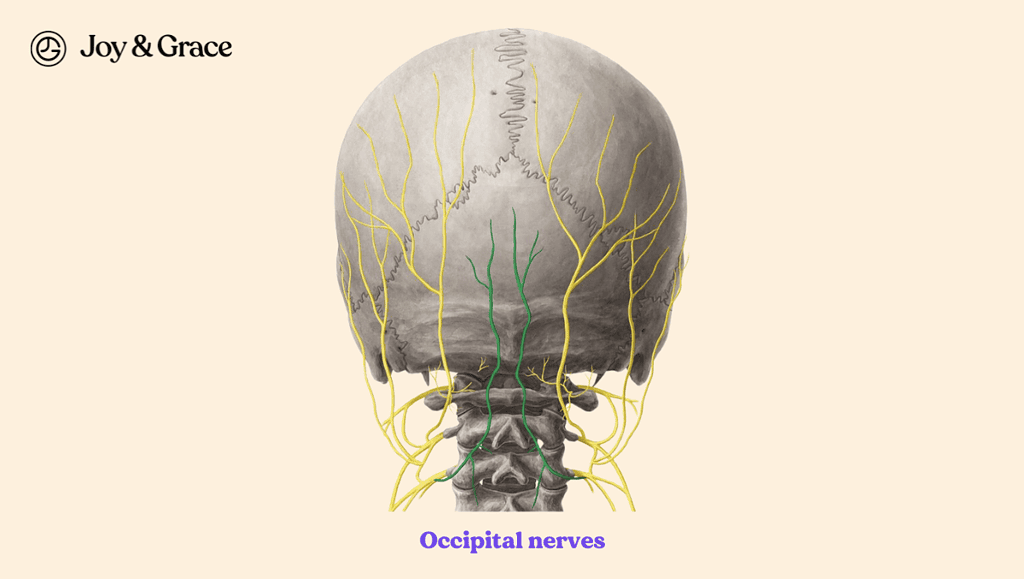
Occipital neuralgia can cause a stiff neck because the occipital nerves run through the upper part of the neck and into the scalp and ears. When irritated or inflamed, these nerves can cause pain, stiffness, and tension in the neck muscles and behind the ears
What Does Occipital Neuralgia Pain Feel Like?
The pain associated with occipital neuralgia can be severe and may feel like a sharp, stabbing, or burning sensation. The pain usually begins at your upper neck and spreads to the back of the head, behind the ears, and the scalp. It typically occurs on only one side of the head.
Some people may confuse the pain from occipital neuralgia as a migraine. Aside from the pain, other symptoms include:
- Neck Stiffness
- Sensitivity to light and sound
- Tender scalp
- The affected area may become extremely sensitive to light touch (allodynia)
But before you start thinking you have occipital neuralgia, there is a list of criteria that must be met in order to be diagnosed with this condition. These are:
| Clinical Criteria For Occipital Neuralgia |
| Feeling pain on one or both sides of your head and neck, following the path of the greater, lesser, or third occipital nerves. |
| The pain must meet at least two of the following:Occurs in sudden bursts, lasting seconds to minutes per episodeSevereShooting, stabbing, or sharp sensation |
| The pain is associated with:Abnormal sensations such as tingling or burning in response to stimulation of the scalp or hair (dysaesthesia). There may also be pain in response to harmless stimulation of the scalp or hair (allodynia).One or both of the following:Pain or tenderness in the affected nerves.Sore points (trigger points) where the greater occipital nerve starts or in the area of the C2 spinal nerve. |
| There is temporary relief after using a local anesthetic nerve block on the affected nerves |
| The pain can’t be explained by another diagnosis |
What Causes Occipital Neuralgia To Flare Up?
Occipital neuralgia can be caused by several factors, including:
- Head or neck injury
- Inflammation, or compression of the nerves due to muscle tension or a structural issue in the spinal column
It may be triggered by things like neck movement, pressure on the back of the head, or even just touching the affected area.
What Can I Do To Relieve The Ear And Neck Pain From Occipital Neuralgia?

Here are some tips for relieving occipital neuralgia:
- Apply a warm compress
Place a warm, damp washcloth over the affected area for 10 to 15 minutes at a time. This can help relieve pain and relax tight muscles in the neck. Heating pads are also a great idea.
- Practice relaxation techniques
Stress and tension can exacerbate occipital neuralgia. So practicing relaxation techniques may help reduce the frequency and severity of symptoms. These include deep breathing, meditation, or yoga.
- Take over-the-counter pain relief medication
Nonsteroidal anti-inflammatory drugs (NSAIDs) such as ibuprofen can help reduce pain and inflammation. Always follow the dosage instructions on the packaging, and do not exceed the recommended dose.
- Massage therapy
Massage therapy can help alleviate muscle tension. This may reduce pain associated with occipital neuralgia. You can ask a professional massage therapist or your health care provider for specific techniques and areas to focus on.
- Acupuncture
Acupuncture can help reduce pain and promote relaxation by stimulating specific points in the body.
In one case, a 78-year-old woman with occipital neuralgia did not want to take medications or have invasive procedures. She requested acupuncture treatment to relieve her pain.
The patient received five acupuncture treatments for eight days. After the first treatment, the patient experienced substantial relief from the pain. By the end of the fifth treatment, her symptoms had completely resolved.
- Physical therapy
Physical therapy can help improve posture, strengthen neck muscles, and reduce muscle tension. These can all contribute to the relief of occipital neuralgia.
Can Ear Infections Spread To Neck?
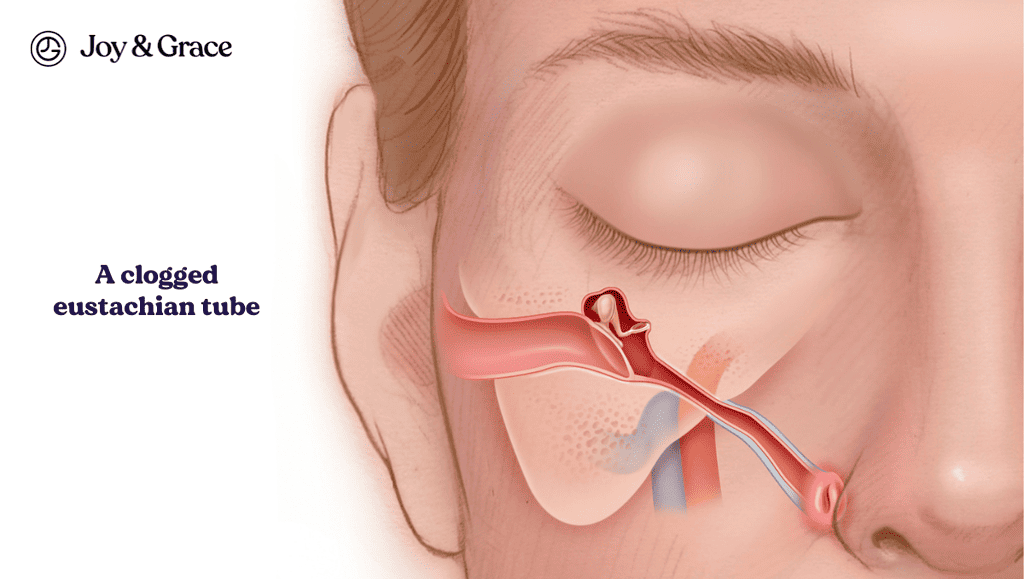
Otitis media is an infection or inflammation of the middle ear, the area behind the eardrum. The infection can spread to the neck if the structures in the middle ear become damaged. However, the infection can spread beyond the middle ear to nearby tissues, even without any damage.
The middle ear is connected to the back of the throat by a small tube called the Eustachian tube. This tube helps to equalize pressure between the middle ear and the throat and also helps to drain fluids from the middle ear.
When the Eustachian tube becomes blocked or does not function properly, fluids can accumulate in the middle ear. This creates an environment that is conducive to viral or bacterial infections.
It’s important to note that complications are uncommon in adults and have an overall incidence of only 0.78%.
Can An Ear Infection Cause My Neck To Be Stiff And Painful?
Meningitis, Bezold's abscess, and Lemierre syndrome are potential complications of an ear infection. These severe complications can all cause neck pain and stiffness.
Bezold's abscess is a rare complication of otitis media. It occurs when the infection spreads from the middle ear to the mastoid bone, which is located behind the ear. Only 28 cases have been reported in English literature from 2000 to 2020, according to a PubMed search.
The infection can cause an abscess to form in the mastoid bone. If left untreated, the infection can dig through the bone and spread to the surrounding tissues, including the lymph nodes in the neck. This can result in neck stiffness, pain, swelling, and tenderness in the affected area.
Another complication of mastoiditis is Lemierre syndrome. However, it is also considered very rare and occurs in only 2.7% of cases. One of the common symptoms of Lemierre syndrome is a stiff neck. This is often caused by inflammation and infection of the internal jugular vein. This can also lead to pain and difficulty moving the head and neck.
What Does A Meningitis Stiff Neck Feel Like?
An ear infection can also cause meningitis. Meningitis is the inflammation of the lining of your brain and spine and is considered the most common complication of otitis media.
A study looked at 12 patients who had acute otitis media that led to meningitis. Among the most common symptoms reported by the patients were ear pain and neck stiffness.
A stiff neck from meningitis is often described as a soreness or aching sensation in the neck that makes it difficult to move the head from side to side. The neck may also feel stiff and tense, and touching or moving the head may be painful. In some cases, the stiffness can be severe enough to make it difficult to bend the neck forward, known as nuchal rigidity.
Other symptoms of meningitis can include:
- Fever
- Severe headache
- Vomiting
- Sensitivity to light
- Confusion
- Rash
How Can I Relieve Ear And Neck Pain From An Ear Infection
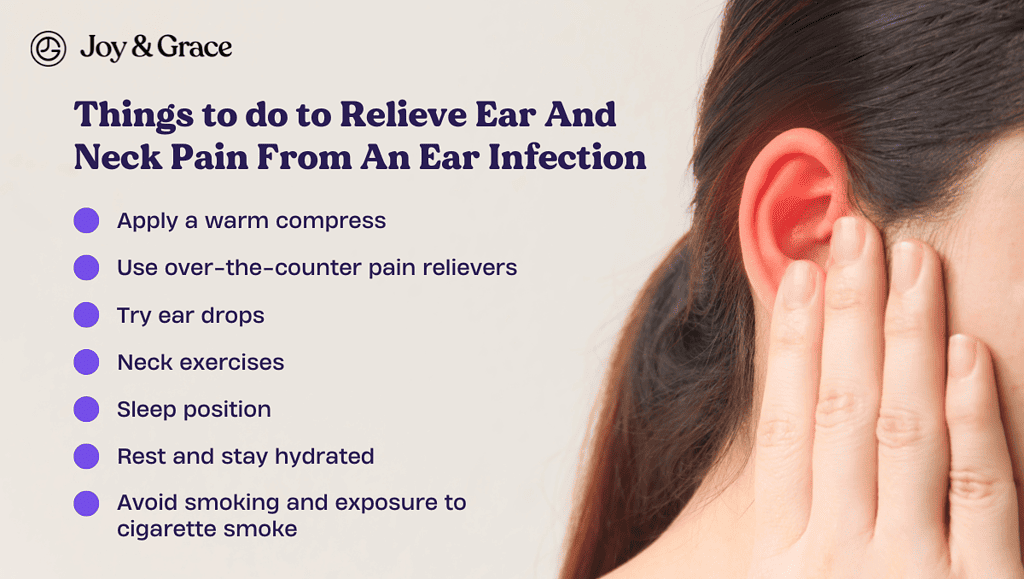
Going to a doctor for otitis media is important because this condition can cause serious complications. Medical treatments such as antibiotics can help clear the infection and reduce the risk of complications.
However, there are some things you can do at home to help relieve the pain while you wait for your appointment or for your antibiotics to take effect.
- Apply a warm compress
Place a warm, damp washcloth over the affected ear and neck for 10 to 15 minutes at a time. Repeat this several times a day to help relieve the pain. Heating pads are also recommended.
- Use over-the-counter pain relievers
Nonsteroidal anti-inflammatory drugs (NSAIDs) such as ibuprofen and acetaminophen can help reduce pain and fever.
- Try ear drops
Over-the-counter ear drops can also help relieve pain and reduce inflammation. Always follow the instructions on the packaging. And if you need clarification on whether the drops are safe to use, consult a pharmacist or your doctor.
- Neck Exercises
Neck stretches and exercises can also help relieve the built-up pressure in your ear.
- Sleep Position
The way you sleep can play a role in relieving ear pain. Elevating your head with two or more pillows can help alleviate pressure in the affected ear by keeping it higher than the rest of your body.
Sleeping on the opposite side can also help if only one ear is affected. While elevating your head may not significantly reduce pressure, it can offer relief.
- Rest and stay hydrated
Resting and staying hydrated can help your body fight off the infection and reduce inflammation. Be sure to drink plenty of water and get enough rest.
- Avoid smoking and exposure to cigarette smoke
Smoking, and exposure to cigarette smoke can irritate your ear and worsen the pain. Try to avoid smoking and exposure to secondhand smoke.
Can Neck And Shoulder Pain Cause Earache?

Sometimes neck and shoulder problems can cause pain behind your ears. This is a form of secondary otalgia, or ear pain caused by issues outside your ears. More specifically, it is termed cervical otalgia.
Cervical otalgia refers to ear pain originating from the cervical (neck) region. In other words, it is a type of referred pain that occurs in the ear but is caused by a problem in the neck.
The mechanism of cervical otalgia is related to how the nerves in the neck and ear are connected. The nerves that supply sensation to the ear and the neck come from the same region of the spinal cord. These nerves travel through the spaces of your spine and include the greater auricular and lesser occipital nerves.
The greater auricular and lesser occipital nerves are part of a group of nerves in the neck called the cervical plexus. These nerves travel over the sternocleidomastoid muscle and provide sensation to the skin behind the ear and over the mastoid bone and parotid gland.
If there are problems with the cervical spine (the bones in the neck), it can cause referred ear pain. Referred ear pain is known as pain that is felt in the ear even though the ear itself is not the source of it. In this case, it originates from the neck.
According to a study, the most common causes of cervical otalgia are degenerative diseases of the spine. These include:
- Degenerative arthritis
- Spondylosis
- Spinal stenosis
- Cervical disc herniation
- Cervical otalgia
These diseases can affect the nerves and muscles in the neck, causing pain that is felt in the ear.
Can Neck Tension Cause Pain Behind the Ear?
It turns out that sometimes tension in your neck muscles can also cause ear pain. This is because there are muscles in your neck that can refer pain behind your ear when they become tense or tight.
There are primarily two muscles that usually cause referred ear pain:
- The first is called the sternocleidomastoid muscle.
This muscle runs along the side of your neck, from the base of your skull to your collarbone. When this muscle is tight, it can cause pain that radiates from your neck to your ear.
In one case, a 50-year-old man came to a pain clinic because of severe pain in the back of his right ear. The pain lasted only a few seconds each time, and the man had no medical problems that could explain the pain.
Upon physical exam, the man's neck also had a limited range of movement. The doctor then found that the pain was related to certain points in his sternocleidomastoid muscle.
- The second muscle is called the trapezius muscle.
It runs from the base of your skull to the middle of your back and across your shoulder blades. When this muscle is tense, it can cause pain in your neck and shoulder region that can also radiate up to your ear.
In another case, a 48-year-old woman sought medical consultation because of ear pain for the past two weeks. The doctors examined her and found no problems with her ears or other medical conditions. The doctors referred her to a pain clinic, where they found severe muscle contraction in the trapezius muscle.
The doctors used a thin needle to stimulate the tender points in her muscles, which caused the muscles to twitch and then relax. After the treatment, the patient's ear pain improved by 70%, and after a week, the pain was gone entirely.
We have a great list of exercises for your neck muscles here.
Takeaway
If you're experiencing a stiff neck and pain behind your ear, there could be a variety of reasons why. Muscle strain, otitis media, TMJ disorder, spinal problems, meningitis, and occipital neuralgia are all potential culprits.
While the causes may differ, there is a common thread - these conditions can cause ear and neck pain. The good news is that most of them are treatable.
If you're experiencing these symptoms, seeking medical attention to determine the cause and receive appropriate treatment is important.
In the meantime, you can try techniques like warm compresses, relaxation techniques, and over-the-counter pain medicine to help alleviate your symptoms.
